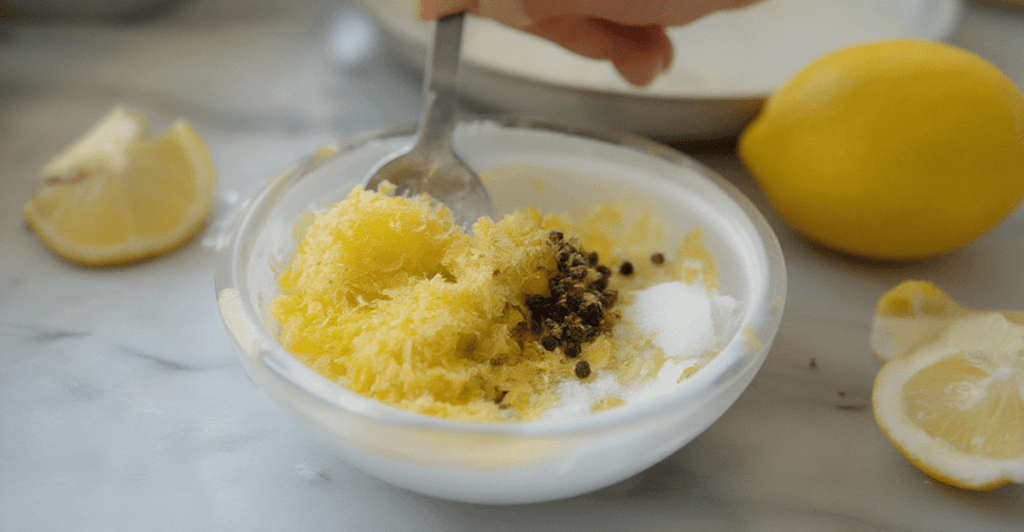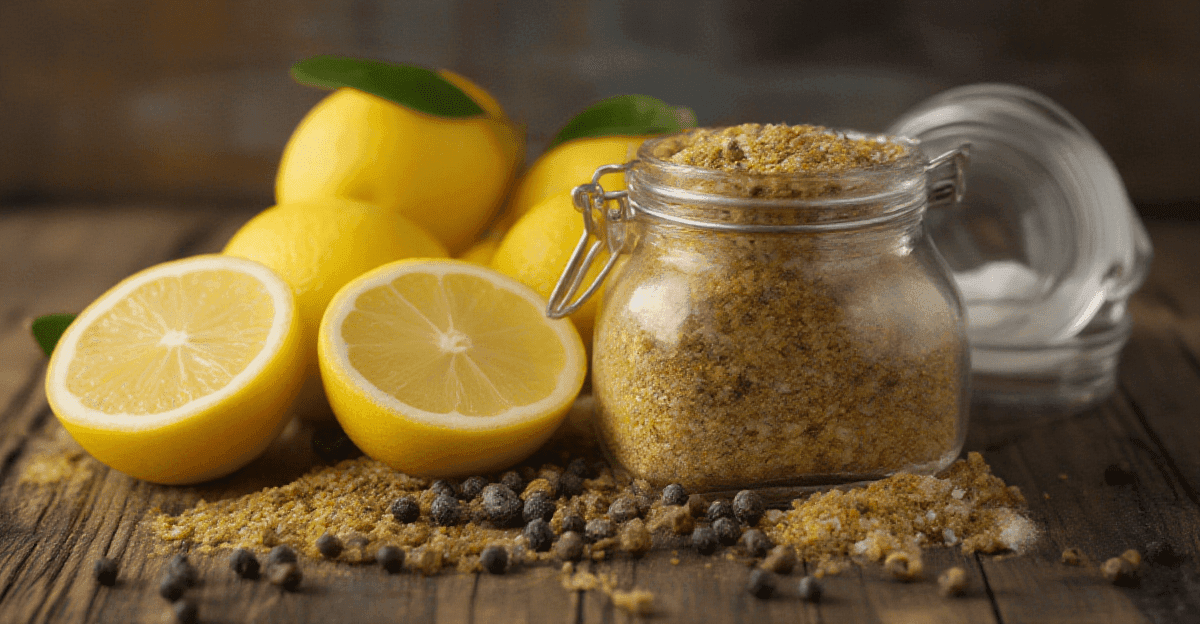Lemon pepper is a versatile seasoning known for its tangy citrus flavor and spicy kick, making it a staple in kitchens worldwide. However, if you ever find yourself needing a substitute for lemon pepper, there are plenty of alternatives that can enhance your dishes just as effectively. Its unique blend of dried lemon zest, black pepper, and salt is commonly used to elevate various recipes, from grilled chicken to roasted vegetables. Whether you’ve run out of lemon pepper, have dietary restrictions, or want to explore new flavor combinations, finding the right substitute can save the day.
Finding a good substitute for lemon pepper can save your recipe while introducing new and exciting flavors. This guide explores several alternatives to lemon pepper, offering options for every cooking style and dietary need. Whether you’re looking for a quick fix from ingredients in your pantry or a creative twist on the classic seasoning, we’ve got you covered.
What is Lemon Pepper?
Lemon pepper is a seasoning mix loved for its bright and zesty flavor with a hint of spice. It’s a common addition to many recipes, especially those that need a citrusy punch. If you’ve ever had lemon pepper chicken or sprinkled it on vegetables, you know how it can transform a simple dish into something truly flavorful.
But what exactly is lemon pepper made of? Let’s break it down:
Ingredients in Lemon Pepper
At its core, lemon pepper contains three main ingredients:
- Lemon Zest: The outer layer of the lemon peel is dried and ground into small bits. This gives the seasoning its strong citrusy aroma and taste.
- Black Pepper: The coarsely ground black peppercorns add a sharp, slightly spicy note that balances the citrus flavor.
- Salt: Salt enhances the other flavors and helps preserve the mix for longer shelf life.
Some store-bought versions might also include garlic powder, onion powder, or herbs like thyme to add extra depth.
Flavor Profile of Lemon Pepper
The flavor of lemon pepper is bright, tangy, and spicy all at once. It’s the kind of seasoning that works equally well on savory dishes and even some light salads. When used in cooking, it brings out the natural flavors of ingredients like chicken, fish, vegetables, and pasta.
Culinary Uses of Lemon Pepper
Lemon pepper is super versatile. Here are some popular ways people use it:
- Grilling and Roasting: Sprinkle it on chicken, fish, or vegetables before grilling or roasting.
- Salads: Add it to salad dressings for a tangy kick.
- Pasta and Rice: Stir it into pasta sauces or rice dishes for a citrusy flavor.
- Snacks: Dust it over popcorn or potato wedges for a unique twist.
Now that we’ve explored what makes lemon pepper so special, let’s discuss why you might need a substitute in the first place.
Why Would You Need a Substitute for Lemon Pepper?

Lemon pepper is a popular seasoning, but there are many reasons why you might need to replace it in a recipe. Don’t worry—it happens to all of us! Let’s explore some common situations where finding a good substitute is necessary.
You Don’t Have Lemon Pepper at Home
One of the most common reasons is simply running out of lemon pepper. Maybe you thought you had some in your pantry, but when it’s time to cook, it’s nowhere to be found. Instead of rushing to the store, you can use some creative substitutes with ingredients you likely already have on hand.
Dietary Restrictions or Allergies
Sometimes, store-bought lemon pepper seasoning contains ingredients that might not suit everyone. For instance:
- Salt Sensitivity: Many lemon pepper mixes are high in sodium, which might not work for low-sodium diets.
- Additives: Pre-packaged lemon pepper may include preservatives, artificial flavors, or anti-caking agents that some people prefer to avoid.
- Allergies: If you or someone you’re cooking for has a citrus allergy, you’ll need a substitute without lemon.
Personal Taste Preferences
Not everyone enjoys the tangy and slightly spicy flavor of lemon pepper. Some people prefer a milder seasoning, while others might want to experiment with new flavors. Using substitutes allows you to tailor the dish to your liking, adding more or less spice or tang as needed.
Cooking Constraints
Sometimes, the recipe itself can influence the need for a substitute. For example:
- Wet Recipes: Lemon pepper is a dry seasoning, so if you’re making a sauce or marinade, you might need a liquid alternative like lemon juice and pepper.
- Herb-Based Dishes: Recipes that require fresh herbs may need a substitute that blends well with the natural flavors of those herbs.
Availability of Ingredients
If you’re in a location where lemon pepper isn’t a common product or if certain ingredients aren’t in season (like fresh lemons), substitutes can save the day.
Smooth Transition to the Next Section
Now that we’ve covered why you might need a replacement for lemon pepper, let’s move on to the fun part—exploring the best substitutes you can use. Whether you’re in a pinch or looking for something new to try, there’s a substitute out there for every situation.
Best Substitutes for Lemon Pepper
If you find yourself without lemon pepper or need a replacement for any reason, don’t worry! There are several easy and effective substitutes you can use. Each option has its unique flavor and works well for specific recipes. Let’s dive into some of the best alternatives.
DIY Lemon Pepper

The easiest and closest substitute for lemon pepper is making it yourself at home. If you have lemons and black pepper, you’re halfway there!
How to Make DIY Lemon Pepper
- Ingredients Needed:
- Fresh lemon zest (the outer yellow part of the peel, grated).
- Black pepper (preferably freshly ground).
- Optional: Salt and garlic powder for added flavor.
- Steps to Prepare:
- Grate the lemon peel to get the zest. Avoid the white part, as it’s bitter.
- Mix the zest with black pepper and a pinch of salt.
- If you want to store it for later, dry the mixture by spreading it on a baking sheet and baking it at a low temperature (around 200°F or 90°C) until it’s completely dry.
- When to Use: DIY lemon pepper is perfect for recipes that require dry seasoning, like grilled chicken, roasted vegetables, or fish.
Citrus Zest with Black Pepper
If you don’t have time to make a full batch of lemon pepper, you can use this quick substitute.
How It Works
- Take some freshly grated lemon zest and mix it with black pepper.
- For a stronger flavor, add a little salt to mimic the taste of lemon pepper seasoning.
Best Recipes for This Substitute
This mix works well for:
- Pasta dishes.
- Salad dressings.
- Meat marinades.
The freshness of the zest adds a bright, tangy flavor to your dish.
Lemon Juice and Black Pepper
If you’re making a dish that involves liquids, lemon juice combined with black pepper is a fantastic alternative.
How to Use Lemon Juice and Black Pepper
- Mix a tablespoon of lemon juice with a teaspoon of black pepper.
- Adjust the amount based on your recipe’s flavor needs.
Best Uses
This combination works especially well in:
- Sauces and marinades.
- Soups and stews.
- Stir-fries, where a liquid seasoning blends easily.
Lime Pepper
Lime pepper is a close cousin of lemon pepper and can be used as a one-to-one substitute. It’s made from lime zest instead of lemon, but the flavor profile is very similar.
When to Use Lime Pepper
This option is great for recipes where a slightly different citrus note is acceptable, such as:
- Grilled seafood.
- Mexican dishes.
- Spicy chicken wings.
Herbal Alternatives with Citrus Notes
If you’re out of citrus but have herbs like thyme or rosemary, you can create a flavorful substitute.
How to Prepare an Herbal Substitute
- Mix dried thyme, rosemary, or parsley with black pepper and garlic powder.
- If you want a citrusy kick, add a little bit of vinegar or citrus-infused oil.
Best Recipes for Herbal Substitutes
This blend works well for:
- Oven-roasted potatoes.
- Grilled meats.
- Herbaceous pasta dishes.
Commercial Blends
If you don’t want to make a substitute from scratch, check your pantry for other pre-made spice blends like:
- Lemon herb seasoning.
- Garlic lemon seasoning.
- Cajun seasoning (for a spicier twist).
Using Store-Bought Blends
These options often have similar flavor profiles and can save you time. Adjust the amount based on the saltiness and spice level of the mix.
Vinegar and Pepper
If you’re in a real pinch, vinegar can act as a stand-in for lemon. Combine it with black pepper for a tangy and spicy flavor.
How to Use Vinegar and Pepper
- Use a tablespoon of white vinegar, apple cider vinegar, or rice vinegar with a teaspoon of black pepper.
- Mix it into marinades, dressings, or sauces.
Best Uses
This substitute is ideal for recipes where you need both acidity and spice, such as salad dressings or slow-cooked dishes.
With all these substitutes, you’ll never have to worry about running out of lemon pepper again! Next, let’s explore how to choose the best substitute for your specific dish.
How to Choose the Best Substitute for Lemon Pepper
Now that you know several substitutes, you might wonder: which one should I use? The best choice depends on your recipe, the flavors you want, and the ingredients you have on hand. Let’s break it down step by step.
Consider the Recipe Type
Different dishes call for different textures and flavors.
For Dry Recipes
If you’re making something like roasted vegetables, grilled meats, or dry rubs, a dry substitute works best. Options like DIY Lemon Pepper or Citrus Zest with Black Pepper will mimic the texture and flavor of lemon pepper seasoning.
For Sauces and Marinades
If your recipe needs a liquid ingredient, go for a wet substitute like Lemon Juice and Black Pepper or Vinegar and Pepper. These blend easily into sauces, soups, or marinades.
For Herb-Based Dishes
For recipes with fresh or dried herbs, consider using Herbal Alternatives with Citrus Notes. They’ll complement the herbs while still providing a hint of citrus and spice.
Match the Flavor Profile
Think about the balance of flavors in your dish. Lemon pepper brings:
- Citrus Tang: Use lemon zest, lemon juice, or lime for that bright and zesty flavor.
- Peppery Spice: Black pepper is the main source of spice in lemon pepper, so don’t skip it.
- Saltiness: If your substitute doesn’t include salt, add a pinch to balance the flavors.
For example, if your dish relies heavily on the tangy lemon flavor, use substitutes like Lemon Juice and Pepper. If you need more spice, try a stronger black pepper base.
Think About Cooking Methods
Your cooking method can also influence the best substitute to use.
High-Heat Cooking
For grilling, roasting, or baking, dry substitutes like DIY Lemon Pepper or Lime Pepper work well because they won’t burn or lose their flavor during cooking.
Low-Heat Cooking
For dishes like stews, soups, or slow-cooked recipes, wet substitutes like Lemon Juice and Pepper or Vinegar and Pepper are perfect since they blend well over time.
Adjust to Your Preferences
Lastly, your personal taste plays a big role in choosing the right substitute.
Experiment with Flavors
If you enjoy experimenting, try mixing substitutes! For instance:
- Combine Herbs with Citrus Zest for a more complex flavor.
- Add a splash of Lemon Juice to store-bought Lemon Herb Seasoning for extra zing.
Be Mindful of Salt and Spice
Taste as you go. Some substitutes might be more salty or spicy than lemon pepper, so start with small amounts and adjust to your liking.
With these tips, you can confidently pick the perfect substitute for any recipe. Next, we’ll look at practical advice for using your chosen substitute and making it work flawlessly in your cooking.
Tips for Substituting Lemon Pepper in Recipes
Now that you’ve chosen a substitute for lemon pepper, let’s talk about how to use it effectively in your recipes. Substituting a key ingredient can be tricky, but with these simple tips, you can ensure your dishes still turn out delicious.
Measure Your Substitutes Carefully
Using the right amount of your substitute is important for balancing flavors.
Start Small and Taste
When trying a new substitute, it’s best to start with a small amount. For example:
- If you’re using Lemon Juice and Black Pepper, start with 1 tablespoon of lemon juice and ½ teaspoon of pepper.
- For DIY Lemon Pepper, use the same amount the recipe calls for, but taste and adjust if needed.
You can always add more, but it’s harder to fix a dish if the flavors are too strong.
Adjust for Salt
Most lemon pepper seasonings include salt. If your substitute doesn’t, don’t forget to add a pinch of salt to your recipe. On the other hand, if you’re using a commercial seasoning blend as a substitute, it might already be salty, so taste your dish before adding extra.
Balance Flavors
Lemon pepper has a unique combination of tangy, spicy, and salty flavors. When substituting, try to maintain this balance.
Add Acidity for Tanginess
If your substitute lacks the tangy kick of lemon, consider adding:
- A splash of vinegar (white vinegar, apple cider vinegar, or rice vinegar).
- A squeeze of fresh lemon or lime juice.
This can enhance the brightness of your dish and make up for the missing lemon flavor.
Don’t Forget the Peppery Spice
Black pepper is an essential part of lemon pepper. Make sure your substitute includes enough pepper to give the dish a slightly spicy edge. If you prefer a milder flavor, use less pepper and adjust to your taste.
Match the Cooking Method
Using substitutes correctly depends on how you’re cooking your dish.
For Roasting or Grilling
If you’re grilling or roasting, dry substitutes like DIY Lemon Pepper or Citrus Zest with Black Pepper will work best. Sprinkle the substitute evenly over the food to ensure consistent flavor.
Heading 4: For Sauces and Marinades
For wet recipes, liquid substitutes like Lemon Juice and Black Pepper or Vinegar and Pepper will blend seamlessly. Stir them into the sauce or marinade until the flavors are evenly distributed.
Experiment with Creativity
One of the best things about using substitutes is that it gives you the chance to experiment with new flavors.
Mix and Match Ingredients
Don’t be afraid to combine substitutes! For example:
- Mix lemon zest with a pinch of garlic powder for a unique twist.
- Add a sprinkle of herbs like thyme or rosemary to your citrus zest and black pepper blend for extra flavor.
Adjust to Your Dish
Think about the type of dish you’re making and customize your substitute accordingly. For example:
- Add more lemon juice for a tangier salad dressing.
- Use extra black pepper for spicier chicken or fish.
Keep Shelf Life in Mind
If you’re making a homemade substitute, consider its freshness.
Storing Dry Substitutes
Dry substitutes like DIY Lemon Pepper can last for weeks if stored in an airtight container in a cool, dry place.
Storing Wet Substitutes
Wet substitutes like Lemon Juice and Black Pepper are best used fresh, but you can store them in the fridge for a day or two. Be sure to taste before using, as flavors may fade over time.
Now that you know how to use substitutes for lemon pepper, you’re all set to create amazing dishes. But if you still have questions, don’t worry—we’ve answered some common ones in the next section.
FAQs
Is Lemon Pepper Different from Lemon and Pepper?
Yes, lemon pepper is different from just combining lemon and black pepper. Lemon pepper is a seasoning mix that usually includes dried lemon zest, coarsely ground black pepper, and salt. Sometimes, it also contains other spices like garlic powder or onion powder.
On the other hand, using fresh lemon juice or zest with black pepper can mimic the flavor, but it won’t have the same dry, uniform texture as the store-bought blend. This difference can affect how it’s used in recipes—lemon pepper is more versatile for dry rubs, while lemon and pepper are better for liquid marinades or sauces.
Is Lemon Pepper Anti-Inflammatory?
Yes, lemon pepper can have some anti-inflammatory properties, but it’s not a guaranteed solution for inflammation.
Here’s why:
- Black Pepper: Contains a compound called piperine, which has been studied for its potential anti-inflammatory and antioxidant effects. Piperine may help reduce inflammation in the body.
- Lemon Zest: Contains vitamin C and antioxidants, which also support overall health and may have mild anti-inflammatory benefits.
While these ingredients can contribute to a healthy diet, the amounts used in seasoning are small. For more significant anti-inflammatory benefits, consider a balanced diet rich in fruits, vegetables, and other anti-inflammatory foods like turmeric or ginger.
Is Lemon Pepper an Atlanta Thing?
Yes, lemon pepper has become a cultural phenomenon in Atlanta, particularly in the world of food. Atlanta is famous for its lemon pepper wings, a dish that has gained iconic status in the city.
What makes Atlanta’s lemon pepper wings unique is the way they’re prepared. One popular variation is lemon pepper wet, where the wings are tossed in a buttery lemon pepper sauce instead of just the dry seasoning. This style has been popularized by Atlanta restaurants and has become a beloved part of the city’s food culture.
While lemon pepper itself is not exclusive to Atlanta, the creative way it’s used there—especially in wings—has given it a special place in the city’s culinary identity.
Conclusion
Lemon pepper is a versatile and flavorful seasoning that elevates many dishes with its tangy, zesty, and spicy notes. However, when it’s unavailable, there are plenty of substitutes that can save the day. From DIY lemon pepper to simple combinations like lemon juice and black pepper or more creative alternatives such as lime pepper and herbal blends, you can easily find an option that works for your recipe and taste preferences.
Choosing the right substitute depends on the type of dish, cooking method, and the flavors you want to highlight. By experimenting with these substitutes, you might even discover a new favorite way to season your meals.
Beyond its culinary uses, lemon pepper holds a special place in food culture, particularly in Atlanta, where it’s synonymous with their iconic wings. Its ingredients also bring mild health benefits, making it a flavorful and functional addition to a balanced diet.

